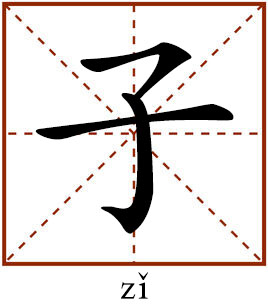Child

In addition to its basic meaning of “child,” the character zi is also the root for words expressing respect, titles and honorifics. Persons to be awarded the “zi” honorific include Confucius (Kongzi), Mencius (Mengzi), Laozi, Zhuangzi and many other ancient Chinese famous figures.
君子好逑
jūn zǐ hǎo qiú
Though commonly used to refer to a person of virtue, junzi in this line refers to a male character. Hao means “good” and qiu refers to a mate (of junzi).
This is a line from a poem in the Shijing (The Book of Songs). “The waterfowl would coo/ Upon an islet in the brook./ A lad would like to woo/ A lass with nice and pretty look./ There grows the water grass/ The folk are fond to pick;/ There lives the pretty lass/ For whom the lad is sick./ Ignored by the pretty lass,/ The lad would truly yearn./ The day is hard to pass;/ All night he’ll toss and turn . . .” (trans. Wang Rongpei).
The Shijing is the first comprehensive anthology of poems in Chinese history, including 305 poems composed over several centuries. A great number of its poems were created by laborers orally as folk songs, many of which are about love and marriage. This poem titled “Guanju” (“The Cooing”) is a famous poem about love.
The poem begins with the onomatopoeic cry of jujiu, or ospreys. Inspired by a pair of ospreys calling on a river islet, the male narrator expresses his aspiration to find a good and fair maiden as a match for himself. The language in the Shijing has a beautiful musical effect. However, it is hard to translate its poems as most of the poems are made up of stanzas containing four four-syllabic lines. Reiterative stanzas, reiterative lines, reiterative words and rhyming compounds are all frequently used. Therefore, a better way to enjoy the poems from the Shijing is to read the various translations of them: “Hark, from the islet in the stream the voice/ Of the fish hawks that o’er their nest rejoice!/ From them our thoughts to that young lady go,/ Modest and virtuous, loth herself to show,/ Where could be found, to show our prince’s state/ So fair, so virtuous, and so fit a mate?” (trans. Willian Jennings); “Guan! Guan! Cry the fish hawks/ on the sandbars in the river;/ a mild-mannered good girl,/ fine match for the gentleman” (trans. Arthur Waley).
edited by REN GUANHONG
